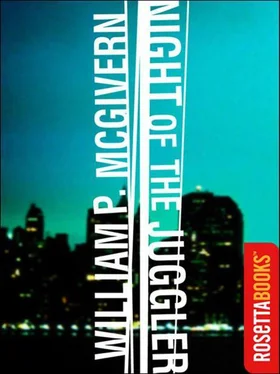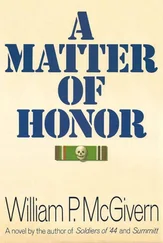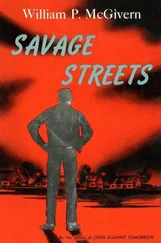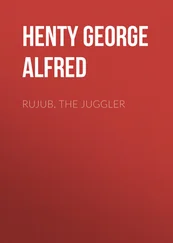William McGivern - Night of the Juggler
Здесь есть возможность читать онлайн «William McGivern - Night of the Juggler» весь текст электронной книги совершенно бесплатно (целиком полную версию без сокращений). В некоторых случаях можно слушать аудио, скачать через торрент в формате fb2 и присутствует краткое содержание. Жанр: Триллер, на английском языке. Описание произведения, (предисловие) а так же отзывы посетителей доступны на портале библиотеки ЛибКат.
- Название:Night of the Juggler
- Автор:
- Жанр:
- Год:неизвестен
- ISBN:нет данных
- Рейтинг книги:3 / 5. Голосов: 1
-
Избранное:Добавить в избранное
- Отзывы:
-
Ваша оценка:
- 60
- 1
- 2
- 3
- 4
- 5
Night of the Juggler: краткое содержание, описание и аннотация
Предлагаем к чтению аннотацию, описание, краткое содержание или предисловие (зависит от того, что написал сам автор книги «Night of the Juggler»). Если вы не нашли необходимую информацию о книге — напишите в комментариях, мы постараемся отыскать её.
Night of the Juggler — читать онлайн бесплатно полную книгу (весь текст) целиком
Ниже представлен текст книги, разбитый по страницам. Система сохранения места последней прочитанной страницы, позволяет с удобством читать онлайн бесплатно книгу «Night of the Juggler», без необходимости каждый раз заново искать на чём Вы остановились. Поставьте закладку, и сможете в любой момент перейти на страницу, на которой закончили чтение.
Интервал:
Закладка:
But what a cruel kindness it had been, Samantha thought.
Emma and Missoura had worked for a white family, the Meltons, in the twenties in Mobile, Alabama. They lived in the black community on the outskirts of town, without heat, light, or plumbing facilities on meadows that were churned frequently into nightmarish quagmires by seasonal rains and hurricanes that swept across them from the Florida coastlines. But Emma and Missoura shared a comparative comfort with their elderly mother, subsisting on toting privileges and what money the Meltons paid them.
It had been on one of those rainy nights when Mr. Melton committed that act of kindness which sang down the filaments of time and caused Samantha’s throbbing headaches when the Gypsy asked her for official favors.
One night Mr. Melton had told his black chauffeur, Abraham, to drive the girls home during a rainstorm. Abraham had been frightened and had made some excuse. No chauffeur drove dumb black maids around in those days. So Mr. Melton drove the girls home himself. He had done the same thing on numerous other occasions. He had been warned by white friends that he was making a mistake; he was ridiculed for it. And he was threatened because of it.
But Mr. Melton hadn’t budged, had driven the girls home whenever the weather was too bad for the five-mile walk. If he’d done it just once, Samantha thought, she could write it off as just plain damn foolishness. But he had done it for the three and a half years the girls had worked for the Melton family.
The stories of Mr. Melton, sagas more like it, had come down to Maybelle Cooper like tales from King Arthur’s Court.
On one occasion when a pack of red-neck white trash had circled the shanty town, screaming filth at Mr. Melton and the coloreds huddling in their cold shacks, Mr. Melton had leaped from his car and had shouted songs of freedom and glory at them in a fine, vigorous voice and the red-neck pack had slunk off into the shadows.
When she was a little girl, it had amused Samantha to hear her grandmother talk about Mr. Melton and croak off-key phrases from songs like “The West’s Awake” and “Kelly, the Boy from Killan,” and to listen to her re-create the picture of that big Irishman standing in driving rains and chasing away yellow bastards with his powerful voice and songs of freedom. When Samantha went to school in New York, she found some of the songs in an old sheet-music shop and had picked out the tunes with one finger on an upright piano in the school gym.
One line she had never forgot: “The harp he loved, ne’er spoke again, for he tore its chords asunder. And said ‘No chains shall sully thee, the soul of love and liberty. Thy songs were made for the pure and free, they shall never sound in slavery.’”
During her adolescence, Samantha had tried to convince herself that Mr. Melton had done only what any decent man would do; he had done what only a courageous, sensitive, and feeling man would have done, and the worm in Samantha’s soul was that she hated him for it.
Mrs. Schultz stood behind the police lines, so swaddled in sweaters under her bulky cloth coat that she looked almost as wide as she was tall. Mrs. Schultz had asked the policeman if she could go into the park. In her worried old head was the thought that she might find Gus and talk some sense to him before he hurt the girl. But when the policeman asked her why, she didn’t tell him because that would only lead to other questions. About Gus and other nights. And why their family had no records when they came from Canada into the United States.
She told him she wanted to use a toilet, and he told her there was one off the lobby of the Plaza. She nodded and went off into the crowd.
Imagine her in the Plaza in her old cotton stockings and worn coat.
She watched a tall man approach the police line, accompanied by a slim girl with a scarf knotted about her blond hair. She heard him say to a policeman, “Wayne, the New York Times . This is Crescent Holloway. She’s with me.”
The patrolman nodded and waved them past the barriers into the park.
Watch him, his mother had said, Mrs. Schultz thought bitterly and wearily, but how could she help him if no one would let her? Her lips moved in prayer. In her halting English she said, “Holy Mary, Mother of God, pray for us sinners, now and forever. . amen.”
Barbara Boyd was alone in the rear of a police squad when Paul Wayne stopped beside the car and spoke to her.
“Mrs. Boyd? Paul Wayne, the Times .”
“Yes,” she said.
A strikingly beautiful girl stood with Paul Wayne, and her face was vaguely familiar to Barbara.
“Crescent Holloway, Mrs. Boyd. She’s a friend of Rudi Zahn’s.”
What did they want from her? Barbara wondered, because she could see questions in their eyes, in their expressions. But she couldn’t help them. She couldn’t think of anything but a desperate black terror that was like a physical presence inside her body. She sat hugging her arms across her breasts, numb and isolated in the orderly turmoil of the command post. This concentration of equipment and manpower didn’t touch Barbara Boyd; nothing existed for her but the terrible certainty that her daughter was dead. Not taken away with a merciful illness, not dying in a split-second fall from a horse, but taken away-Christ, no! she pleaded silently, but the dreadful thought could not be exorcised-taken away by a sadistic monster who would torture and terrify her before finally killing her.
Her only hope was contained in a cruel paradox. The facets of her husband’s character that she hadn’t understood, that she had been critical of were the only strengths that might save their daughter’s life tonight. She wasn’t afraid for him, but she longed to be with him.
“I’m really terribly sorry, Mrs. Boyd,” Crescent Holloway said. “Words are pretty stupid now. I’ll just say some prayers.”
“Thank you,” Barbara said.
“Mrs. Boyd, do you know where Mr. Zahn is?” Wayne asked her.
“He was so brave,” Barbara said. “He tried to save my child.”
She was in shock, Crescent realized; her eyes were glazed, and a tiny tic pulled rhythmically at the corner of her lips.
“Did he say where he was going?”
“He just went away. He said he hadn’t done enough. He said he’d never done enough.”
Ilana, Crescent thought, while an anxious fear stirred in her heart.
Was that where Rudi had gone? Into this dark and dangerous park to look for a lost little girl who had disappeared from his life but never his memories almost three decades ago?
Paul Wayne took Crescent’s arm and led her away from the squad car.
“We can check with Lieutenant Tonnelli,” he said.
They found the Gypsy standing with a cluster of detectives and patrolmen studying the brilliantly illuminated contour map of the park.
But Tonnelli had no news of Rudi Zahn. “Thought he was with Mrs. Boyd,” he said, and beckoned to one of the detectives of his unit, Jim Taylor. He told Taylor to pick a detail of men and start looking for Rudi Zahn.
As Taylor went off, Max Prima came hurrying up to Gypsy Tonnelli.
“Got a message from that black lady that shylocks up in Harlem. She wants to talk to you, says it’s important.”
“Where is she?”
“Parked due east of here, on the drive.”
There were two cars parked on the East Drive, Samantha’s green Cadillac and Biggie Lewis’ white Imperial. As Tonnelli crossed the brightly lighted CP with Max Prima, he saw that Biggie, Coke, and Samantha were standing on the lawn beside the cars, and beside them were Manolo Ramos, a faggot hustler, and a pair of young black boys he didn’t recognize.
Prima and Gypsy Tonnelli stopped, and Tonnelli looked at Samantha and drew a thumbnail down the length of his scar.
Читать дальшеИнтервал:
Закладка:
Похожие книги на «Night of the Juggler»
Представляем Вашему вниманию похожие книги на «Night of the Juggler» списком для выбора. Мы отобрали схожую по названию и смыслу литературу в надежде предоставить читателям больше вариантов отыскать новые, интересные, ещё непрочитанные произведения.
Обсуждение, отзывы о книге «Night of the Juggler» и просто собственные мнения читателей. Оставьте ваши комментарии, напишите, что Вы думаете о произведении, его смысле или главных героях. Укажите что конкретно понравилось, а что нет, и почему Вы так считаете.












